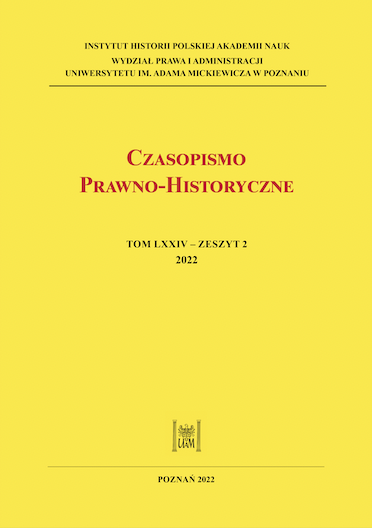Prawo natury i prawo stanowione we wstępie do Komentarzy do Praw AngliiWilliama Blackstone’a
NATURAL LAW AND POSITIVE LAW IN THE INTRODUCTION TO WILLIAM BLACKSTONE’S “COMMENTARIES ON THE LAWS OF ENGLAND”
Author(s): Dariusz ŁysakSubject(s): Law, Constitution, Jurisprudence, History of Law
Published by: Uniwersytet Adama Mickiewicza
Keywords: Blackstone; natural law; positive law; Commentaries; English law
Summary/Abstract: Until this very day, the theoretical intentions of William Blackstone, the author of the crucial work for the common law system, namely “The Commentaries on the Laws of England,” arouse disputes, while the author himself is perceived as one of the precursorsof legal positivism as well as one of the representatives of the traditional law of nature. In the Introduction to the Commentaries, there are elements which are characteristic of both these ways of thinking about law. In the present paper, the author attempts to prove that Blackstone’s legal lecture concerning the law of nature is not only ornamental in character, which was typical of his contemporaries, but it constitutes a significant element of his legal doctrine, which also has certain consequences. According to Blackstone, natural law affects positive law in the following manner: 1. it gives us the notion of subjective rights as the structure to understand and interpret law, 2. when statutory law violates natural law, both systems remain separate and binding, thus a person is obliged to violate the positive law and simultaneously accept the sanctions imposed by the state; 3. the legislature, even though it formally remains unlimited in its legislative power in accordance with the principle of parliamentary sovereignty, is obliged to protect and strengthen the innate and absolute rights of individuals, which is an interpretative guideline for those who apply the law. Blackstone’s views are also inspiring today, because they show that natural law considerations can go beyond the rule of lex iniusta non est lex, and instead rather focus on defining the aims of the legislature and they thus constitute an element of legal interpretation.
Journal: Czasopismo Prawno-Historyczne
- Issue Year: 74/2022
- Issue No: 2
- Page Range: 59-86
- Page Count: 28
- Language: Polish

